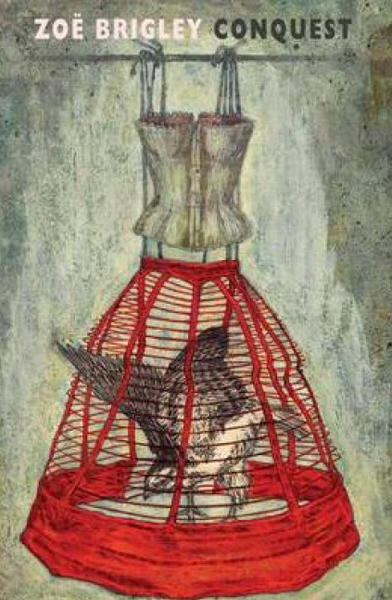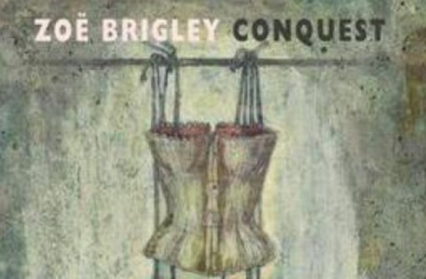Peter DeVille provides an in-depth review of Conquest, a poetry collection by Zoe Brigley which examines the relationship between man and woman.
Zoe Brigley’s second collection has feminist credentials but not militantly so. In fact the central theme is that of seeking the significance of man in a woman’s world. The collection begins with a series of poems exploring the claustrophobic world of the Brontes. The pervasive note here is heavily melancholic, verging on the neurotic. There are half-grasped opportunities for normal relationships but the agonies of separation are both physical and existential: the tone immediately calls to mind Tennyson’s Mariana. The physical can be that of rape as in ‘Behind the Looking Glass’, almost a case-study, with its miserable revelation being ‘How she realised at last that not even love / could justify this, that no affection could, not ever. / Still, in the glass, she sees her own mouth, / opening and closing and silent as a fish.’ This is raw and painful reading and the poet almost certainly draws on her academic work into rape narratives. Of course, male rape also exists but the dominant cast of the collection is on the intrusive male’s lack of female comprehension. For this the female must cultivate inner resilience, acknowledging herself united to a sisterhood. In ‘The Bell Confessing’ the poet herself, a note confirms, handles the small personal objects in the Bronte Museum and admits her affinity to these women, that sisterhood ‘… you and I, our silent closeness that is for me / a sweet, blank victory.’ – blank because, rightly, although inspirational it is not a living relationship. The speaker tells ‘their stories, my story, and I do.’
The women in the collection, mostly solitary or hesitant brides on the point of marrying have a strong sensual awareness usually met with a male lack of understanding and are responded to by assertions of male dominance. In ‘The Scent Bottle’ a woman craves the voluptuous fragrance of a scent bottle lost at sea. She waits patiently and finally gets it back from the male mariner’s world of harsh stinks and odours of ships and ports and smelling of tin ‘rasping metallic blood on the tongue’ and she cradles ‘…the shock of its cold body in my palm. / It is not as beautiful as when it was new / – blasted by salt and scratched by sailors…’ The poem inevitably conjures up in the mind’s eye, as many of the poems do, the image of the mute, tight-lipped Scottish widow, stubborn and inward-looking, intent on getting her piano for herself, in Jane Campion’s film The Piano.

by Zoe Brigley
The drama of shipwreck is used in the excellent poem ‘Passage’ to underline the victory of the resilient woman: ‘… Every night in dreams, / the storm puts its hands on her…’ but she comes through the crisis and returning to port she sees women who will never sail into the storm she knew. She knows ‘she is at equinox, / balancing the sun and moon, grief and hope, / she flies like a wild goose over the ocean.’ Again, a victory for inner resilience even at the cost of isolation.
Many poems trace the cost of that victory. In ‘The Buried Heart’ ‘… my aged pear-tree becomes a conductor: / crippled by lightning it withers to fruit no more’, and in ‘The Mourner’ the intense sisterly love of Charlotte Bronte for her dead sister grieves at the separation, but it is unhealthy, Poe-ish: ‘… love / grows: an anemone tongue / in her mouth, my mouth. / Under my skirt, she’s beating her wings, breaking me apart, setting me free.’ This obsession, resulting from too much brooding, is in ‘The Daughter’ where the speaker’s ‘… ghost daughter stirs … / in a place I can’t reach, like seabeds where no sound has been’ and in ‘My Spinalonga Passion’ where a leper offers his/her infected body for desire – the body is beautiful to the leper who is ‘fulfilled’ in his/her world.
The problem of the significance of a good proportion of the poems is that the poet’s finger weighs a tad too heavily on the balance – seen clearly in ‘Love and the Orchid’. The head-quote is: ‘Like a strange exotic plant, love grows in arid soil.’ Does it? Most, it can be said, would say no, but the poem explores depressive emotional experience whose ‘black dreamlands’ are ‘hardly ever leading to anything.’ Dreams bring yearnings which, being unfulfilled, bring further yearnings and thus a closed cycle.
Certainly there seems an impasse in these poems caused by a lack of trust and openness in relationships and ‘The Face in the Mirror’ crystallizes the situation. For the speaker, ‘I find I mistrust my caller at times / …as if before the year / is out, he’ll be a fox to ravage my garden.’ As it is ‘… he gives morsels each day / to a woman like me, bricked up and walled ….’ The woman is trapped by her own desires and yet she realises ‘the man gazes into me as if to find himself out.’ The man too is caught, blocked by his own narcissism and assertiveness as sexual conqueror: ‘When I close a door to him, he finds a window.’
The woman is trapped by her own desires and yet she realises ‘the man gazes into me as if to find himself out.’
There is a nucleus of poems in the collection where the various persona fade and the poet elaborates more directly at a deeply personal level In ‘Infertility’ there’s the woman’s fear of male infertility, her ‘ripening plum with arid seeds’. Others warn her of the possibility of miscarriages but the woman makes a life assertion where ‘…the only sure thing is a miracle: / the sperm nuzzling in its nest and the egg that opens, explodes.’
That opening comes wonderfully as a solution to the impasse in ‘The Love of a Husband’, a heart-on-the-sleeve poem in which the speaker lists the reasons for her love which is there ‘Because when she shuts a window, he opens a door’ – it works just like that and so simply, a justification of mutual and necessary trust. There is a mutual conquest and victory and the poem sounds a positive note above the many shipwrecked and lonely lives whose traumas are explored in this intense if somewhat gloomy collection.
Peter DeVille writes poetry and prose as well as literary reviews.











